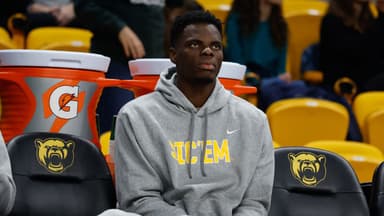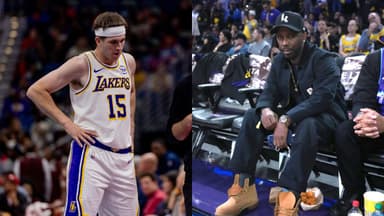With just a 1.8 % chance of winning, the Dallas Mavericks miraculously landed the No. 1 overall pick in the 2025 NBA Draft, beating favorites Washington, Charlotte, and Philadelphia, all of whom held higher odds. NBA fans, analysts, and media alike have been asking questions since then.
Advertisement
What made Dallas’ lottery win especially controversial was that three months prior, the franchise had traded its star Luka Dončić to the LA Lakers. The Mavericks not only grabbed the top pick but also gained the opportunity to select Cooper Flagg — the consensus No. 1 prospect.
And it triggered a barrage of conspiracy theories with many connecting past instances of intriguing Draft Lottery wins as proof of possible foul play. How, and why Dallas? Former NBA player turned podcaster Matt Barnes brought his no‑nonsense take to the controversy in a recent episode of The Skip Bayless Show. And he cited the drafting of LeBron James by the Cleveland Cavaliers to substantiate his take.
Speaking about the lottery, Barnes zeroed in on the odd convergence of events that landed Flagg in Dallas. “For [Cooper Flagg] to somehow someway land in Dallas is absolutely crazy to me,” he remarked.
Skip Bayless then asked whether any “conspiracy theories” might explain the result. Barnes, known for his candidness, pointed to a string of precedents set by coincidence or perhaps design.
His examples included the Chicago Bulls earning the No. 1 pick to draft Derrick Rose in 2008, the Cavaliers landing James in 2003, and once again landing Kyrie Irving in 2011 — all picks that aligned remarkably with particular narratives.
“There’s a whole bunch of conspiracy theories you and I both can come up with. How the hell did he end up there? How did LeBron end up in Cleveland? How Kyrie ends up in Cleveland? How Derrick Rose ends up in Chicago?” Barnes wondered.
“There’s just certain things that happen with that lottery machine sometimes when they need to happen that happen,” he added.
Barnes then reflected on how a prospect’s career trajectory often hinges on the franchise that drafts them. He cautioned that being drafted by a struggling franchise — with coaching instability, shifting cultures, and constant rebuilding — can derail a player’s progress.
“I’m a big component of, sometimes the trajectory of a star depends on where you go. And if you’re one of those bottom‑of‑the‑barrel, terrible teams that have different coaches every year, that can mess up [your career],” said Barnes.
He then described the tale of DeMarcus Cousins as a prime example. Known for his on‑court dominance, Cousins’ career suffered from instability in Sacramento, where he worked under five head coaches — Paul Westphal, Keith Smart, Michael Malone, George Karl, and Dave Joerger — across seven seasons.
His point: Context matters. Draft order carries more than prestige. It places a player in a specific ecosystem that can make or break their development. The “hometown hero” narrative may sell airtime, but Barnes and others argue that it also shifts the landscape of opportunity.
As Flagg prepares to possibly sign with Dallas, the convergence of elite talent and franchise narrative remains under deep scrutiny. Was it pure luck? Intelligent front‑office strategy? Or something else entirely?








